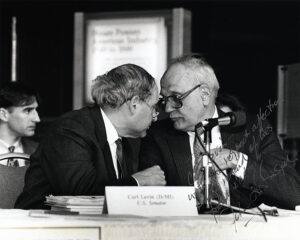Magazine

Michigan’s Moderates
by Terrence J. McDonald, Director
The relatively recent deaths of former Congressman John D. Dingell, former Michigan Governor William G. Milliken, and, most recently, former United States Senator Carl Levin have removed from the political scene three long-serving giants of Michigan political history. Levin was the longest-serving senator in Michigan history, Milliken its longest-serving governor, and Dingell the longest-serving congressman in American history.
What can the lives of such remarkable public service and long-term political success and recognition teach us? Scholars will no doubt argue over this in coming years, and they will do so, in part, by visiting the Bentley archives. The Bentley holds the collections of all three politicians; two of them (Milliken and Levin) are open to the public.

Carl Levin, left, and John Dingell confer in Congress.
But books about each of the three reveal some important preliminary answers. Carl Levin’s autobiography, Getting to the Heart of the Matter (Wayne State University Press), was published in 2021; John Dingell’s autobiography (written with David Bender), The Dean: The Best Seat in the House (Harper), was published in 2018; and Dave Dempsey’s insightful biography of Milliken, William G. Milliken: Michigan’s Passionate Moderate (University of Michigan Press/Petoskey), was written with Milliken’s cooperation and published in 2006.
All three fit the description of Milliken as “passionate moderates.” They were each ideals, but also deeply experienced in the political world and, therefore, committed to the institutions in which they worked. Today, ironically, such experience and institutional commitment marks one as a “moderate.”
John Dingell was, in effect, “born” to his office. His father, John D. Dingell Sr., was elected to Congress from Detroit in 1932. John Dingell became a congressional page in 1938 at age 12 and was paging in the 1941 session when President Roosevelt asked for the declaration of war against Japan. Dingell was 29 when his father died in office, and he took his father’s seat in the special election that followed in 1955. He stayed in Congress until 2015.

William Milliken, far left, walks in a parade with George Romney, middle, and Robert Griffin
Milliken also came from a political family. Both his grandfather and father had represented the Traverse City area in the Michigan State Senate, and Milliken’s own first office was the seat in the State Senate formerly held by his father, in which he served from 1960–1964. He became Michigan lieutenant governor in 1964 and governor in 1970, serving three four-year terms.
The Theodore Levin United States Courthouse in Detroit is named after Carl Levin’s uncle. Carl’s older brother, Sander, was elected to the Michigan State Senate in 1964 and to the United States House of Representatives in 1982. Carl began his political career with election to the Detroit City Council in 1968. It was from there that he made the jump to the Senate in 1970, where he stayed until his retirement in 2015.
Levin tells the story of how surprised he was to realize that election to Detroit City Council just meant that he had to work with the nine other elected members, all of whom had their own strong opinions.
And this experience carried through his career, leading him to believe that “if you don’t come to Congress to compromise, you don’t come to Congress to govern.”
Dingell agreed: “Quoting another famous Michigan man, Gerald Ford, that ‘compromise is the oil that makes governments go.’”
In his farewell address, Milliken movingly quoted the famous federal judge, Learned Hand, extolling “the temper which does not press a partisan advantage to its bitter end . . . .”
As human personalities, these three men could not have been more different. As insightful, courageous, and faithful public servants, they could not have been more similarly “moderate.”
